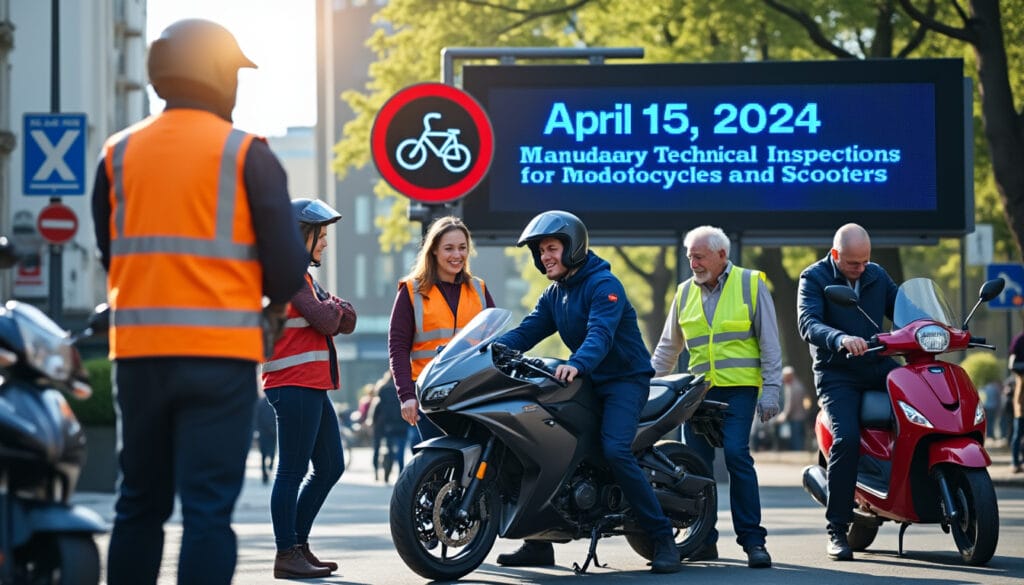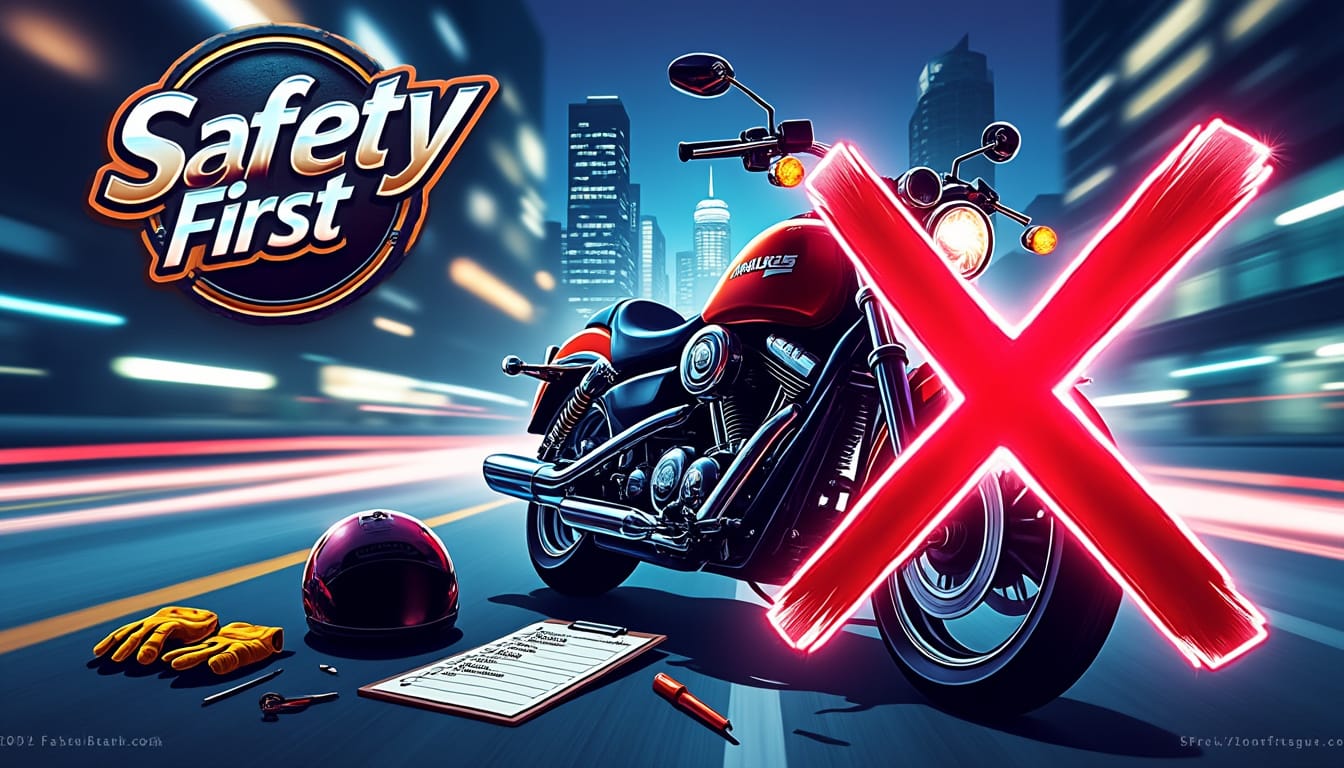Road safety: The introduction of mandatory technical inspection for two-wheelers starting from April 15, 2024

The world of motorcycles and scooters is about to undergo a major turning point. Indeed, starting from April 15, 2024, a mandatory technical inspection will be put in place for all motorized two-wheelers. This measure, stemming from a European directive, aims to enhance the safety of road users. Many motorcyclists are questioning the implications of this new legislation, both in terms of technical requirements and the potential costs associated with this inspection. Through this article, we will explore the details of this new regulation, its objectives, its implementation, and its consequences for drivers.
The legislative context of the mandatory technical inspection
The technical inspection for two-wheelers is now a reality in France, following the publication of a decree in the Official Journal on October 24, 2023. This initiative is part of a broader framework aimed at improving road safety, particularly for two-wheeled vehicles, which are often particularly vulnerable on the road. The safety of road users is a priority issue. The technical inspection aims to evaluate the condition of the vehicle based on specific criteria to avoid accidents caused by a lack of maintenance.
This new legislative framework applies not only to motorcycles but also to mopeds, scooters, motor tricycles, and quadricycles. For motorcyclists, this measure is not only a legal obligation but also a guarantee of safety. Indeed, a vehicle in good working order is less likely to experience failures on the road. France would not be the first to adopt this measure, as several other European countries have already implemented it, thereby contributing to the reduction of fatal accidents.

The details of the implementation of the technical inspection
The implementation of the technical inspection for two-wheelers will be gradual, based on the date of first registration of the vehicle. Starting from April 15, 2024, vehicles registered before January 1, 2017, will need to undergo their first technical inspection between April 15 and August 14, 2024. For example, a vehicle registered in 2015 must undergo its inspection during this period. For those registered before 2017 but with an anniversary date after April 15, the inspection must be done no later than four months after the anniversary date, up until December 31, 2024.
Newer vehicles will follow a different schedule. For registrations between 2017 and 2019, the first inspection will be required in 2025, while those registered between 2020 and 2021 will need to have their inspection done in 2026. Finally, vehicles registered after 2022 will need to undergo their first inspection within 4.5 to 5 years of their entry into circulation. It is crucial for motorcyclists to be informed of these deadlines to avoid any potential fines related to the absence of an inspection.
The process of the technical inspection
During the technical inspection, the professional will focus on several critical elements of the motorcycle. The condition of the brakes, pollutant and noise emissions, reflective devices and electrical equipment, as well as the condition of mirrors and tires will be scrutinized. This inspection aims to ensure that the vehicle complies with the current standards. An effective inspection not only guarantees the peace of mind of drivers but also that of other road users.
The functioning of lights, condition of axles, wheels, and suspensions will also be checked. In cases of failure, it can be classified into three categories: minor, major, and critical. Minor failures do not affect the safety of the vehicle, while major ones may compromise safety. Critical failures prohibit driving until they are resolved. This highlights the fundamental role that the technical inspection plays in road safety.
The consequences for motorcyclists
The application of this technical inspection raises many questions among motorcyclists. On the one hand, this measure aims to enhance road safety by ensuring that each vehicle is in good condition before hitting the road. On the other hand, it leads to additional costs for drivers, particularly in terms of repairs that may be necessary following an inspection. This could become an additional source of stress for some motorcyclists, already concerned about the expenses related to the regular maintenance of their vehicle.
Violations of this obligation will result in fines. Thus, a motorcyclist who does not comply with these new regulations will be liable for a fine of 135 euros. This figure is expected to incentivize drivers to conform to the new standards. Motorcyclists must be aware of these consequences to avoid any unnecessary penalties. In addition to the fine, they may also be forced to travel without their vehicle until the re-inspection is completed, which can lead to significant inconveniences in their daily lives.

The advantages of regular technical inspections
Beyond the legal obligations, the implementation of regular technical inspections can have real benefits for motorcyclists. Regular maintenance of the vehicle not only allows for the early identification of potential failures but also optimizes the functioning and durability of the motorcycle. A well-maintained vehicle presents less risk of accidents, minimizes insurance costs, and enhances driving comfort.
Moreover, a technical inspection can enhance drivers' confidence. Being sure that their vehicle is in good condition allows them to ride with peace of mind and focus on the road. By taking care of their machine, motorcyclists also contribute to the safety of other road users.
Conclusion on road safety and the technical inspection
It is essential that all stakeholders – from motorcyclists to technical inspection professionals – are well informed about the implications of this legislation. Good communication around this technical inspection is fundamental to promote its acceptance and ensure its proper implementation. Motorcyclists must be educated on the challenges related to road safety as well as the benefits of a well-maintained vehicle. The mandatory technical inspection for two-wheelers represents a significant step towards enhanced road safety, protecting not only motorcyclists but also all road users. However, this will require a period of adaptation and general awareness-raising to ensure a safer future on our roads.

Staying informed about the next steps
To stay updated on upcoming regulations and participate in road safety information campaigns, motorcyclists can consult dedicated websites and subscribe to newsletters. Being well-informed is the key to anticipating legislative changes and adapting to new requirements while making an informed choice regarding their vehicle. Additionally, technical inspection centers will inform motorcyclists about the procedures and costs of inspections, ensuring a smooth transition to this new regulation.
Leave a Reply



Articles relatifs